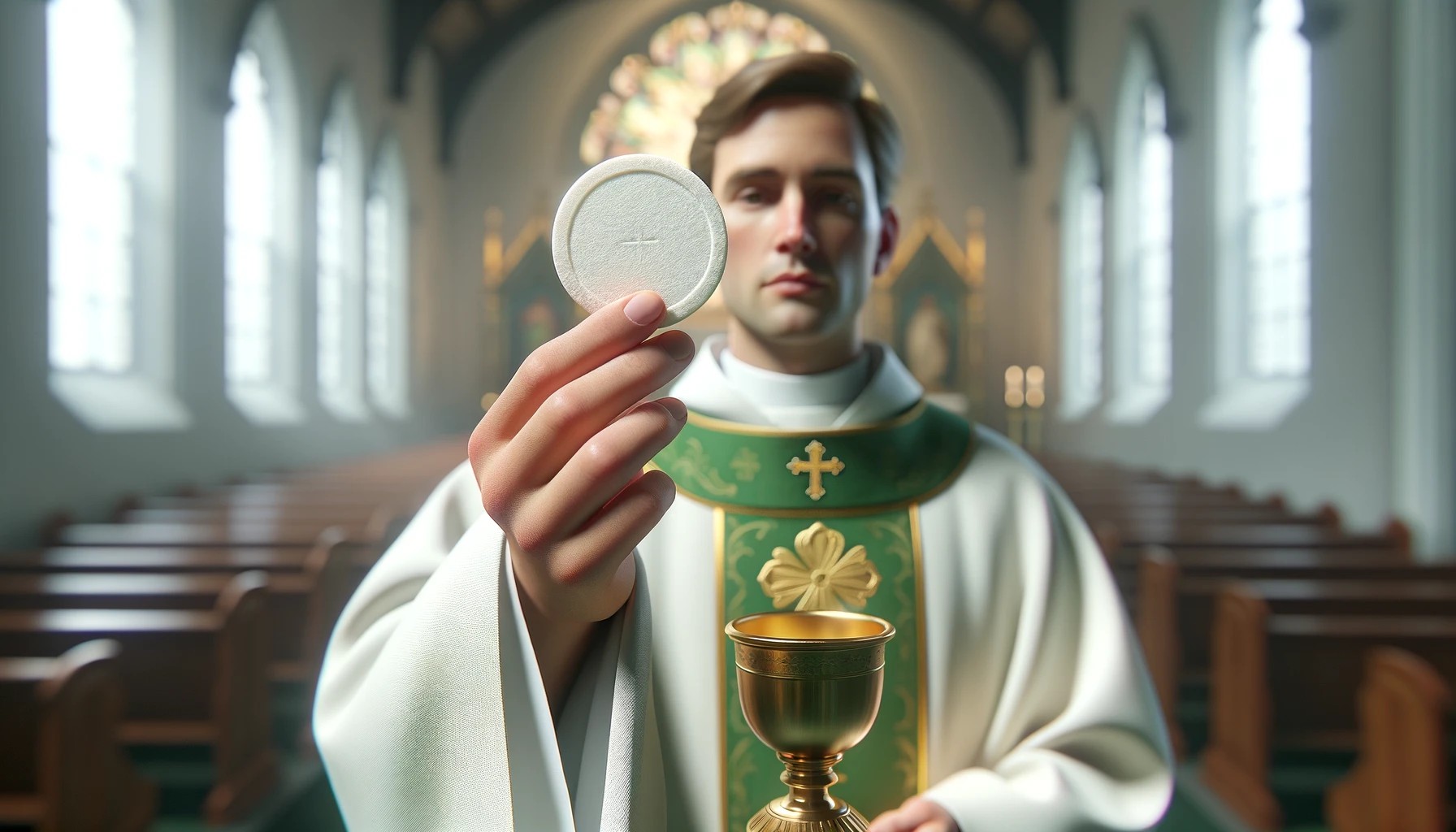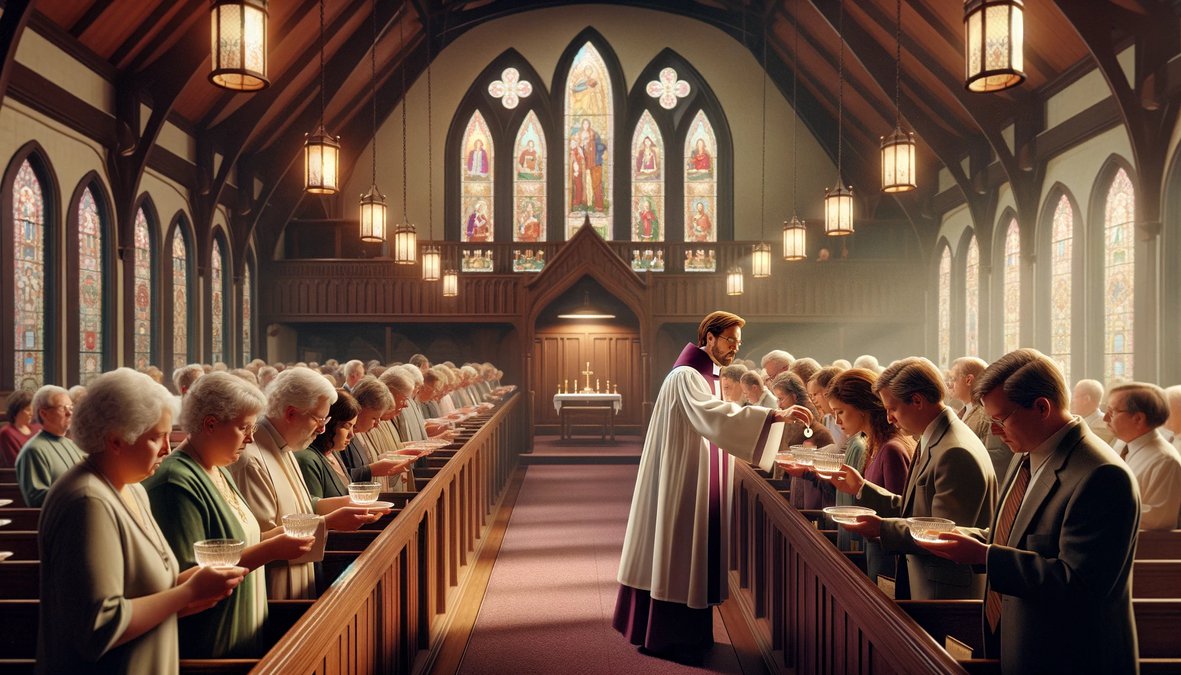Home>Theology and Spirituality>When Can You Take Communion In The Catholic Church


Theology and Spirituality
When Can You Take Communion In The Catholic Church
Published: February 24, 2024
Jason DeRose, Managing Editor at Christian.net, uses his expertise in religion and journalism to deepen understanding of faith's societal impacts. His editorial leadership, coupled with a strong academic background, enriches the platform’s diverse content, earning him recognition in both journalism and religious circles.
Learn about the Catholic Church's guidelines for receiving communion and the significance of this sacrament in theology and spirituality. Discover when you can partake in communion as a Catholic.
(Many of the links in this article redirect to a specific reviewed product. Your purchase of these products through affiliate links helps to generate commission for Christian.net, at no extra cost. Learn more)
Table of Contents
Introduction
The Sacrament of Communion, also known as the Eucharist, holds profound significance within the Catholic Church. It is a sacred ritual that symbolizes the spiritual nourishment and unity of believers with Christ and one another. Understanding the guidelines and principles surrounding the reception of Communion is essential for Catholics, as it reflects their reverence for the Eucharist and their commitment to the teachings of the Church.
In this comprehensive guide, we will delve into the requirements and considerations for receiving Communion in the Catholic Church. From the fundamental principles to the special circumstances that may arise, this exploration aims to provide clarity and insight into the sacramental practice of Communion. Whether you are a devout Catholic seeking to deepen your understanding or an individual curious about the traditions of the faith, this article will offer valuable insights into the significance and protocols of receiving Communion in the Catholic Church.
Understanding the Sacrament of Communion
The Sacrament of Communion, also known as the Eucharist, is a central and revered practice within the Catholic Church. It holds profound theological and spiritual significance, representing the core tenets of the Catholic faith. At its essence, Communion symbolizes the spiritual nourishment and unity of believers with Christ and one another.
The origins of the Eucharist can be traced back to the Last Supper, a pivotal event in Christian theology. During this sacred gathering, Jesus shared bread and wine with his disciples, instructing them to partake in remembrance of him. This act of sharing the bread and wine, symbolizing the body and blood of Christ, forms the foundation of the Eucharistic celebration in the Catholic tradition.
Central to the Catholic understanding of the Eucharist is the concept of transubstantiation, a theological doctrine that asserts the transformation of the bread and wine into the actual body and blood of Christ during the Mass. This belief underscores the profound mystery and sacredness of the Eucharist, emphasizing the real presence of Christ in the consecrated elements.
The celebration of Communion is a deeply communal and spiritual experience for Catholics. It serves as a means of encountering the living Christ, fostering a sense of unity and communion within the faith community. Through the reception of the Eucharist, Catholics affirm their faith in the sacrificial love of Christ and their commitment to living out the teachings of the Church.
Furthermore, the Eucharist is viewed as a source of grace and spiritual nourishment, providing strength and sustenance for the journey of faith. It is a sacred moment of encounter with the divine, inviting believers to deepen their relationship with God and one another.
In summary, the Sacrament of Communion holds profound significance within the Catholic tradition, embodying the spiritual nourishment, unity, and encounter with the living Christ. Its rich theological and spiritual dimensions underscore its centrality in the life of the Church, making it a revered and cherished practice for Catholics around the world.
Requirements for Receiving Communion in the Catholic Church
Receiving Communion in the Catholic Church is a sacred and revered practice that is accompanied by certain requirements and considerations. These guidelines are rooted in the theological and canonical traditions of the Church, reflecting the reverence and solemnity with which the Eucharist is approached. Understanding the prerequisites for receiving Communion is essential for Catholics, as it underscores the significance of this sacramental act and the commitment to living out the teachings of the Church.
State of Grace
One of the primary requirements for receiving Communion in the Catholic Church is being in a state of grace. This entails being free from mortal sin, as sin creates a barrier to the full reception of the graces offered through the Eucharist. Catholics are encouraged to participate in the Sacrament of Reconciliation, also known as Confession, to seek forgiveness for any grave sins before receiving Communion. By reconciling with God and the Church through the sacrament of Confession, individuals can approach the Eucharist with a purified heart and a renewed spirit.
Fasting
Another important requirement pertains to fasting before receiving Communion. The Church prescribes a period of fasting, typically one hour before receiving the Eucharist. This practice is rooted in reverence and preparation, signifying a spiritual readiness to partake in the sacred meal. By observing the fast, Catholics demonstrate a spirit of discipline and anticipation as they approach the Communion table.
Understanding and Reverence
In addition to the aforementioned requirements, a fundamental aspect of receiving Communion in the Catholic Church involves a genuine understanding of the Eucharist and a spirit of reverence. Catholics are called to approach the reception of the Eucharist with faith, humility, and a deep awareness of the sacred mystery they are partaking in. This entails a belief in the real presence of Christ in the Eucharist and a disposition of reverence and awe towards the sacrament.
Affirmation of Catholic Faith
Furthermore, individuals who receive Communion in the Catholic Church are expected to affirm the teachings and beliefs of the Church. This includes acknowledging the authority of the Church in matters of faith and morals, as well as embracing the core doctrines and dogmas of the Catholic faith. By doing so, individuals express their unity with the Church and their commitment to living out the teachings of Catholicism.
In summary, the requirements for receiving Communion in the Catholic Church encompass being in a state of grace, observing the prescribed fast, approaching the sacrament with understanding and reverence, and affirming the teachings of the Church. These prerequisites underscore the sacredness of the Eucharist and the spiritual disposition with which Catholics are called to approach this central sacrament of the faith.
When Can Children Receive First Communion?
The reception of First Communion is a momentous and cherished milestone in the lives of Catholic children. It marks their initiation into the sacramental life of the Church and their first participation in the Eucharistic celebration. The timing of a child's First Communion is a significant decision that reflects the readiness and understanding of the young individual to partake in this sacred sacrament.
In the Catholic tradition, the age at which children receive First Communion can vary based on cultural, regional, and diocesan practices. However, the typical age for First Communion in many Catholic communities is around seven to eight years old. This age is considered significant as it aligns with the developmental stage at which children are deemed capable of understanding the basic concepts of the Eucharist and demonstrating a growing awareness of their faith.
The preparation for First Communion often involves a period of religious education and formation, during which children are instructed in the significance of the Eucharist, the rituals of the Mass, and the spiritual meaning of receiving the body and blood of Christ. This preparation aims to nurture the children's understanding of the sacrament and cultivate a sense of reverence and awe as they approach their First Communion.
In some dioceses, the reception of First Communion may be preceded by the sacrament of Reconciliation, allowing children to experience the grace of forgiveness and reconciliation before partaking in the Eucharist. This practice underscores the interconnectedness of the sacraments and the importance of spiritual readiness for receiving the body and blood of Christ.
While the age for First Communion is often around seven to eight years old, it is important to note that the readiness of the child is paramount. Some children may demonstrate a profound understanding of the Eucharist and a deep reverence for the sacrament at an earlier age, while others may require additional time for spiritual growth and comprehension. As such, the decision regarding the timing of a child's First Communion is often made in consultation with parents, guardians, and the parish community, taking into account the individual child's readiness and spiritual development.
In summary, the reception of First Communion is a significant rite of passage for Catholic children, marking their entry into the sacramental life of the Church. While the typical age for First Communion is around seven to eight years old, the decision regarding the timing of this sacramental milestone is guided by the child's readiness, understanding, and spiritual preparedness. It is a joyous occasion that celebrates the child's growing faith and their participation in the sacred ritual of the Eucharist.
Special Circumstances for Receiving Communion
In the Catholic Church, there are special circumstances that may arise, necessitating thoughtful consideration and pastoral discernment regarding the reception of Communion. These circumstances encompass a range of situations that may impact an individual's ability to fulfill the standard requirements for receiving the Eucharist. It is essential for the Church to approach these scenarios with compassion, understanding, and a commitment to upholding the integrity of the sacrament.
One such circumstance involves individuals who are unable to observe the prescribed fast before receiving Communion due to health reasons. The Church recognizes that certain medical conditions or treatments may necessitate regular nourishment, making it challenging to fulfill the traditional fasting requirement. In such cases, pastoral guidance and accommodation are offered to ensure that individuals can participate in the Eucharist while attending to their health needs.
Additionally, there are instances where individuals may be living in irregular marital situations, such as being divorced and remarried civilly without an annulment. The Church acknowledges the complexity of these situations and emphasizes the importance of pastoral care and accompaniment for individuals facing such challenges. In line with the teachings of Pope Francis and the principles of discernment, pastors are called to engage in compassionate dialogue with individuals in these circumstances, seeking to provide spiritual support while upholding the teachings of the Church.
Furthermore, there are individuals who, due to their affiliation with other Christian traditions, may desire to receive Communion in the Catholic Church. The Church approaches these interfaith scenarios with a spirit of ecumenism and respect for the diverse religious backgrounds of individuals. Pastoral discernment and dialogue play a crucial role in addressing these situations, with a focus on fostering understanding and unity while respecting the theological differences between Christian denominations.
Moreover, there are instances where individuals may be physically or geographically distant from a Catholic parish, such as in remote or isolated areas. In these circumstances, the Church endeavors to provide pastoral care and support, recognizing the challenges individuals may face in accessing the Eucharist. Pastoral initiatives, such as outreach programs and pastoral visits, are employed to ensure that individuals in these situations can receive the spiritual nourishment and support they seek.
In summary, special circumstances for receiving Communion in the Catholic Church encompass a range of complex and nuanced situations that require pastoral discernment, compassion, and a commitment to upholding the integrity of the sacrament. By approaching these circumstances with understanding and pastoral care, the Church seeks to ensure that individuals facing unique challenges can experience the grace and presence of Christ in the Eucharist, fostering a spirit of inclusion and accompaniment within the faith community.
Read more: When Not To Take Communion
Conclusion
In conclusion, the Sacrament of Communion holds profound significance within the Catholic Church, embodying the spiritual nourishment, unity, and encounter with the living Christ. The Eucharist stands as a sacred ritual that symbolizes the core tenets of the Catholic faith, rooted in the Last Supper and the theological doctrine of transubstantiation. It serves as a communal experience that fosters a sense of unity and communion within the faith community, providing believers with grace and spiritual sustenance for their journey of faith.
The requirements for receiving Communion in the Catholic Church, including being in a state of grace, observing the prescribed fast, approaching the sacrament with understanding and reverence, and affirming the teachings of the Church, underscore the sacredness of the Eucharist and the spiritual disposition with which Catholics are called to approach this central sacrament of the faith. These prerequisites reflect the reverence and solemnity with which the Eucharist is approached, emphasizing the importance of spiritual preparedness and adherence to the teachings of the Church.
The reception of First Communion marks a significant milestone in the lives of Catholic children, signifying their initiation into the sacramental life of the Church. While the typical age for First Communion is around seven to eight years old, the decision regarding the timing of this sacramental milestone is guided by the child's readiness, understanding, and spiritual preparedness. It is a joyous occasion that celebrates the child's growing faith and their participation in the sacred ritual of the Eucharist.
Furthermore, special circumstances for receiving Communion in the Catholic Church call for pastoral discernment, compassion, and a commitment to upholding the integrity of the sacrament. Whether addressing health-related challenges, irregular marital situations, interfaith scenarios, or geographical limitations, the Church seeks to ensure that individuals facing unique circumstances can experience the grace and presence of Christ in the Eucharist, fostering a spirit of inclusion and accompaniment within the faith community.
In essence, the Sacrament of Communion stands as a cornerstone of the Catholic faith, embodying the spiritual richness, communal unity, and encounter with the divine that lie at the heart of the Church's tradition. It is a sacred practice that continues to inspire and nourish the faith of believers, serving as a tangible expression of their unity with Christ and one another. As Catholics partake in the Eucharist, they affirm their commitment to living out the teachings of the Church and embracing the transformative power of the sacrament in their lives.













